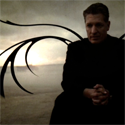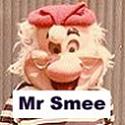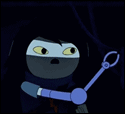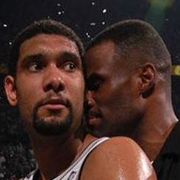|
Blind Sally posted:Franco also did a half-hour test for a Blood Meridian film, if you're interested: http://www.vice.com/read/james-francos-blood-meridian-test-656 Lots of unintentional humor. The Apaches ride up 10 strong then get shot down 30 strong. The caps in the guns and other missing audio. PISS FOR YOUR loving LIVES!!! I've read Blood Meridian twice, I don't remember that line but even if it is in there it was funny as hell on screen. My main thought was, "If Franco ever gets to actually do this, and franco-ly I hope he does, I hope it's on a real budget with steady cams and proper casting and special effects (lots of electro-static discharge and meteorites and the like) and Lawrence of Arabia cinematography with suitably (historically accurate?) sized forces of Apaches and so on. And, like No Country or The Road or Child of God it absolutely must be un-flinching, brutal, in-your-face, and political correctness-be-damned (including all the uses of "friend of the family," which I never knew was used for all the groups it was used in the book.) I know it's bad, but like some other fairly recent work you all remember, if it's period-accurate and accurate to the book, I want it in there. The only real sadness I feel is, "How do you translate the narration into visuals without resorting to a narrator?" The narrator of the book made the book as powerful as it is, instead of just the violence and language. On second thought, let's not make a movie out of this book. (for "not much to say" I said too much, didn't I? Please don't answer that.) Dr. Faustus fucked around with this message at 05:12 on Oct 20, 2014 |
|
|
|

|
| # ? May 15, 2024 06:49 |
|
Dr. Faustus posted:I still can't quite place where I've seen the actor playing The Judge (felt like the caps were necessary) Okay my sperginess caught up with me for this one. It was Mark Pellegrino, who probably is best known for being Jacob on Lost, Rita's ex-husband Paul on Dexter, and the guy who shoves Jeff Bridges' head into the toilet in The Big Lebowski.
|
|
|
|
Dr. Faustus posted:On second thought, let's not make a movie out of this book. I'd rather have someone make an honest attempt at retelling the story in another medium as opposed to letting it be some untouchable hallowed thing. If a movie adaptation sucks, you don't have to watch it. You an write it off and still love the text. After all, there are loads of bad book-adaptation movies.
|
|
|
|
Dr. Faustus posted:
I never thought I'd be saying this in this thread, but....I'm a big fan of P.G. Wodehouse, and that's one of the problems when it comes to adapting his writing, too -- his plots are quite weak, but the narration makes up for it in spades. Yet the Stephen Fry & Hugh Laurie adaptations do a good job in that they don't try to represent the narration in any form but instead they rely on the comedic strength of the actors to convey they same tone. They're still no substitute for the written form, but they're a good time on their own. McCarthy's dialogue in Blood Meridian is a good enough representation of the narrative tone that in the hands of a gifted director, you wouldn't need a voice-over to communicate the narration. You'd get a sense of what the prose is like after you hear the Mennonite warn the troops in the cantina. And take, say, The Assassination of Jesse James by the Coward Robert Ford -- the cinematography, pacing of editing, and soundtrack do extraordinary work at creating a very specific atmosphere, such that you don't need any narration. I picture the Judge as a blend of a hairless Clancy Brown in his prime and the actor who played the bald sinister guy in The Machinist. I think ideally, whoever plays him in a movie made today should be a complete unknown. Rabbit Hill fucked around with this message at 14:21 on Oct 21, 2014 |
|
|
|
Rabbit Hill posted:I never thought I'd be saying this in this thread, but....I'm a big fan of P.G. Wodehouse, and that's one of the problems when it comes to adapting his writing, too -- his plots are quite weak, but the narration makes up for it in spades. Yet the Stephen Fry & Hugh Laurie adaptations do a good job in that they don't try to represent the narration in any form but instead they rely on the comedic strength of the actors to convey they same tone. They're still no substitute for the written form, but they're a good time on their own.
|
|
|
|
Rabbit Hill posted:I never thought I'd be saying this in this thread, but....I'm a big fan of P.G. Wodehouse, and that's one of the problems when it comes to adapting his writing, too -- his plots are quite weak, but the narration makes up for it in spades. Yet the Stephen Fry & Hugh Laurie adaptations do a good job in that they don't try to represent the narration in any form but instead they rely on the comedic strength of the actors to convey they same tone. They're still no substitute for the written form, but they're a good time on their own. There's a lot of narration in Assassination, though, and I quite liked it.
|
|
|
|
There is?? Oops. E: Well, there is some proof that good narration can be done so well you can't remember it being there years after watching the movie. Also, that movie is fantastic and everyone in this thread should watch it. Rabbit Hill fucked around with this message at 17:37 on Oct 21, 2014 |
|
|
|
One of the things I cherish about Blood Meridian is the meteorites. There's this book about a time long past when people barely knew what a "shooting-star" was, but Cormack mentions them and gives them the backstory they deserve. To paraphrase, "ending its timeless journey through the universe to spend itself in the upper atmosphere." I know that's not what he said in the book but it's the feeling I remember. I've read most of his books, and in them there's lots more distant lightning than I've ever experienced. In Blood Meridian there's the static discharge of the iron/steel wagon wheels in the desert. There's the off-screen kidnapping of little children by the Judge. There's the shooting of puppies, for gently caress's sake. Babies nailed to trees. The inexplicable ending between the Man and the Judge. The wholesale slaughter. The meteorites and the meteors, like the 400 lb. one the judge can just pick up and throw. The horses, the bones and body parts on the Glanton gang and the Apaches/other natives. The constant scalping. I just don't see how you do this book justice.
|
|
|
|
Blood Meridian is unfilmable. The dialogue, spoken aloud, would be incomprehensible to anyone who hasn't read the book (maybe even anyone who hasn't read the book at least twice). Just look at the Counselor, which is McCarthy writing modern dialogue* specifically for the screen, and even so the subtext of it whizzes by before you even have a chance to stop and consider what it actually means. The violence would be overwhelming and everything else about it would be oblique. *as much as "you have the most luscious oval office in all of christendom" can be considered modern
|
|
|
|
Dr. Faustus posted:I just don't see how you do this book justice. Eau de MacGowan posted:Blood Meridian is unfilmable. Just because you can't envision something to be so, doesn't mean it's impossible. There could be a young visionary filmmaker out there with the perfect skillset for adapting this film. I'm not saying it wouldn't be difficult or even that it would even be a good movie, but it's still possible we could see a Blood Meridian film at some point. w/r/t the dialogue being incomprehensible, this doesn't seem like a big concern to me. In a visual medium, a lot of "dialogue" also occurs with body language and movement. It's for this reason that many people who are unfamiliar with the language are able to watch Shakespearean plays or movies just fine, while struggling to comprehend reading the scripts, even with copious annotations. And anyways, there's a lot of subtext in Shakespeare's language that is missed in performances and that's just fine. The plays are enhanced by reading the scripts, just like a Blood Meridian movie would be enhanced by reading the book. And anyways, repeated rewatching of a film allows viewers to pick up on details they missed before when they were watching primarily for the plot. Though I suppose repeated viewings would depend on a Blood Meridian movie being worth a rewatch.
|
|
|
|
Rabbit Hill posted:There is?? Oops. I remember how shocked I was when someone told me about the narration in Blade Runner.
|
|
|
|
John Hillcoat is still the only director I could see helming a Blood Meridian adaptation, just because The Proposition managed to nail the kind of atmosphere and gravitas it would require. The biggest problem is always going to be the Judge, just because he's one of those characters that can't exist in the real world. Nobody they could find is going to be as menacing or awe-inspiring as the character in the novel is supposed to be, no matter what kind of camera trickery they use. It's not like Lord of the Rings or something where you can just make the big, scary guys out of CGI or prosthetics and makeup - the end result has to be something that is simultaneously human and inhuman, which is an effect I've never seen a film come even close to achieving. Like even the biggest, meanest looking motherfuckers I've ever seen wouldn't hold a candle to the novel's depiction of The Judge. The sad part is that even if you managed to do everything else perfectly, a bad Judge would basically ruin the film. I'm not against anyone trying to film it, but I wouldn't hold my breath on it being good. I think a lot of the fear with Franco is that he's not really proven he could handle something like BM, and if he hosed it up it would probably mean there wouldn't be another attempt at it for a long, long time. Everyone claimed Watchmen was unfilmable and while I don't think it was a great movie, it was a fairly successful adaptation imo. I definitely don't think that the dialogue is an issue, though. There are films with way, way denser dialogue than anything in BM (Cosmopolis springs to mind), and there are always going to be people that don't get it. I mean there were people whining about the most recent Coriolanus adaptation being impossible to parse. Most of the tricky passages are narration, which would be a much more difficult challenge.
|
|
|
|
Im of the opinion that it would work much better as an hbo series.
|
|
|
|
It's too long for a film so that's actually true unless you're willing to go for a 4+ hour commercially doomed passion project.
|
|
|
|
mdemone posted:You done hosed up. It's his least complex work stylistically and thematically, so the sparseness of the prose might be appropriate but isn't necessarily entertaining taken by itself. About a year late, but the Gass on Gaddis bit sounds fascinating. Any idea where I could track it down?
|
|
|
|
ThetaOmnikron posted:About a year late, but the Gass on Gaddis bit sounds fascinating. Any idea where I could track it down? Not sure where you could find it separately online, but you could always pick up a copy of the book. Gass wrote the introduction to it.
|
|
|
|
Movie chat sucks.Blood Meridian posted:Far out on the desert to the north dustspouts rose wobbling and augered the earth and some said they'd heard of pilgrims borne aloft like dervishes in those mindless coils to be dropped broken and bleeding upon the desert again and there perhaps to watch the thing that had destroyed them lurch onward like some drunken djinn and resolve itself once more into the elements from which it sprang. Out of that whirlwind no voice spoke and the pilgrim lying in his broken bones may cry out and in his anguish he may rage, but rage at what? And if the dried and blackened shell of him is found among the sands by travelers to come yet who can discover the engine of his ruin?
|
|
|
Fellwenner posted:Not sure where you could find it separately online, but you could always pick up a copy of the book. Gass wrote the introduction to it. Ah, that must have been where I'd read it. I think it would have to be the Dalkey edition though; I don't remember the Penguin edition having an introduction, and all my duplicate editions are packed up or I'd check.
|
|
|
|
|
HBO series, practical effects except where too dangerous/unethical, sans subtitles, diegetic music, filmed on location, natural lighting except when/where impractical, Coens directing, Malick on Cinematography, Jodordowsky on costuming (light on the LSD).
|
|
|
|
a starwar betamax posted:Im of the opinion that it would work much better as an hbo series. ASBM, back me up dude. Be my corner man.
|
|
|
|
Frostwerks posted:HBO series, practical effects except where too dangerous/unethical, sans subtitles, diegetic music, filmed on location, natural lighting except when/where impractical, Coens directing, Malick on Cinematography, Jodordowsky on costuming (light on the LSD). que bueno this is the idea of which all other ideas are weak interlopers from a realm beyond reason
|
|
|
|
McCarthy's a prude. He's no Updike. I like those John Updike women. Those tan, middle-aged gals.
|
|
|
|
ShaqDiesel posted:McCarthy's a prude. He's no Updike. The best thing I've ever heard said about Updike is that it's doubtful he has ever had an unpublished thought, but I can't remember who said it. Maybe DFW?
|
|
|
|
ShaqDiesel posted:McCarthy's a prude. He's no Updike. Sadly, that episode just wasn't as good as its own concept. (If anyone doesn't know, this was the reference) https://www.youtube.com/watch?v=llIcg4CK86M
|
|
|
|
Barry Foster posted:Sadly, that episode just wasn't as good as its own concept. Yeah it's sort of hit or miss. Norm MacDonald reading that line made me laugh though.
|
|
|
|
|
I only have Suttree, Outer Dark and The Orchard Keeper left--from this thread I'm gathering that I should read Suttree next? What about TOK and OD?
|
|
|
|
I also need to know how the thread feels about TOK and OD, but I just finished Suttree for the second time not long ago and I think it's just incredible. I can't recommended it enough.
|
|
|
|
Is there any critical consensus or discussion about McCarthy's depiction of people of color, particularly in Suttree (but at least in Blood Meridian as well). There are plenty of times when, as the narrator, he describes a person of color in a way that is undoubtedly unacceptable by modern standards. I generally think McCarthy is above reproach in almost every respect, but sometimes it makes me slightly uneasy- is there any explanation for this type of language that squares with people? To the extent that it's a derogatory description as often as it's neutral, are we to simply accept that we're being narrated a story from an unseen person who is living in the era (and is presumably white), and therefore they get a pass? It just comes across as somewhat jarring, given the wonderfully god-like perspective McCarthy paints his environments in, you'd expect that he'd be a little bit more egalitarian in his treatment of his characters. I assume there's a very reasonable explanation for this that is over my head, otherwise more people would (I hope) voice concerns about it. Can anyone enlighten me?
|
|
|
|
Jewmanji posted:To the extent that it's a derogatory description as often as it's neutral, are we to simply accept that we're being narrated a story from an unseen person who is living in the era (and is presumably white), and therefore they get a pass? It just comes across as somewhat jarring, given the wonderfully god-like perspective McCarthy paints his environments in, you'd expect that he'd be a little bit more egalitarian in his treatment of his characters. If that kind of language is there, it's there for a reason--and with a writer like McCarthy, you can guarantee it isn't from personal racism. He knows the book is too important to let small poo poo like that, if it exists at all, to get in the way. Both Blood Meridian and Suttree capture a time through the language: one that McCarthy obviously didn't see (Manifest Destiny), and one that he lived through (Suttree is more than a little autobiographical). To avoid using words like friend of the family means hedging the truth of those times, even if it's used in omniscient narration. Don't let language like that make you uneasy, and for sure don't let it lead you into a reductive reading. To quote someone a lot smarter about this than I am: Brainworm posted:"Another way of saying this is that 'morality' is never in the text. Like other textual qualities (e.g. aesthetics), it emerges from a relationship between the text, the reader, and a variety of other texts (e.g. history, ideology) that the reader uses as interpretive lenses. Yet another way of saying this is that although texts can address moral issues, the content and import of those issues emerges from the text's relationship with the reader, as well as the context that reader leverages as part of his or her interpretive process."
|
|
|
|
Dr. Faustus posted:I also need to know how the thread feels about TOK and OD, but I just finished Suttree for the second time not long ago and I think it's just incredible. I can't recommended it enough. Eh, The Orchard Keeper is mostly forgettable. It's probably my least liked McCarthy work. Outer Dark is okay. The narrative didn't particularly grip me, but there are moments of dark brilliance that were worth the read at least. If it helps, while I donated The Orchard Keeper to my nearest public library, I kept my copy of Outer Dark.
|
|
|
|
Jewmanji posted:Is there any critical consensus or discussion about McCarthy's depiction of people of color, particularly in Suttree (but at least in Blood Meridian as well). There are plenty of times when, as the narrator, he describes a person of color in a way that is undoubtedly unacceptable by modern standards. I generally think McCarthy is above reproach in almost every respect, but sometimes it makes me slightly uneasy- is there any explanation for this type of language that squares with people? To the extent that it's a derogatory description as often as it's neutral, are we to simply accept that we're being narrated a story from an unseen person who is living in the era (and is presumably white), and therefore they get a pass? It just comes across as somewhat jarring, given the wonderfully god-like perspective McCarthy paints his environments in, you'd expect that he'd be a little bit more egalitarian in his treatment of his characters. Blood Meridian posted:They is four things that can destroy the earth, he said. Women, whiskey, money, and niggers.
|
|
|
|
And just to say it in a slightly different way: no reasonable person would think that Cormac McCarthy holds the opinion that "[they] is four things that can destroy the earth...Women, whiskey, money, and niggers." True, that quote belongs to a character, rather than the narrator -- but we have to think of the narrator as simply another character, speaking in contemporary language. Huck Finn is the canonical example of this, and the fact that in Twain's novel the narrator is also the central character does not and should not make a difference in that regard. Put simply, the author is never speaking in their "own voice", whether or not it was their intent to do so. Even autobiographies are lensed by the difference between textuality and thought. And McCarthy is intimately aware of this fact.
|
|
|
|
|
What did you guys read in the fourth paragraph of BM: A shadowed agony in the garden?
|
|
|
|
Frostwerks posted:What did you guys read in the fourth paragraph of BM: A shadowed agony in the garden? According to Wikipedia "Agony in the Garden" refers to Jesus praying privately in the Garden after the Last Supper. http://en.wikipedia.org/wiki/Agony_in_the_Garden So I guess it refers to the Kid's solitary wanderings?
|
|
|
|
Frostwerks posted:What did you guys read in the fourth paragraph of BM: A shadowed agony in the garden? What page/chapter is that in? The biblical Agony in the Garden is not just about Christ praying privately, but it's Christ's own crisis of faith, where he knows what he is going to have to do the next day (uh, namely, take on the sins of all creation and suffer the torment of crucifixion for them) and is staggered by fear and dread.
|
|
|
|
I have to rant and rave about Blood Meridian. I haven't finished the original Blood Meridian thread yet, but I gotta throw this out there:quote:In that sleep and in sleeps to follow the judge did visit. Who would come other? A great shambling mutant, silent and serene. Whatever his antecedents, he was something wholly other than their sum, nor was there system by which to divide him back into his origins for he would not go. Whoever would seek out his history through what unraveling of loins and ledgerbooks must stand at last darkened and dumb at the shore of a void without terminus or origin and whatever science he might bring to bear upon the dusty primal matter blowing down out of the millennia will discover no trace of ultimate atavistic egg by which to reckon his commencing. As a historian of war I have to stand in awe at what McCarthy says about history and war through the Judge. Students of the history of the war, amateur and professional alike, tend to fetishize it. The more distant and remote the event, the easier it is to minimize the destruction, chaos and suffering inherent to the "ultimate trade". This problem is amplified in the US perception and study of history, as if we look back far enough we see nothing but victory. Many of my fellow historians look back on American conflicts with smiles on their faces, elevating the image of the American war hero above mire in which that image was born. They reminisce and write on the "fact" of a killing, that a fighter pilot or SF guy did kill many people, but don't like to confront what that killing really was. It is a rosy presentation of what is "the shore of a void without terminus or origin", and they assign a moral superiority to the killer without much consideration. Military indoctrination in initial military instruction environments (Boot camps, Officer Candidate Schools) is better. While it presents a very simple depiction of the historical facts, it does have the decency to acknowledge that the being a good killer does not confer moral traits upon a person, but that strong moral factors inherent to a person can translate into the military profession and the practice of war. Admiral Bill McCraven's thesis on Special Operations has great sections on this. Blood Meridian isn't just a great book, it's a great investment. I've found I've spent as much or more time thinking about it than I actually did reading it. I want to shove it at people, but I also feel like I have to warn them that they're going to be spending a lot of time on it.
|
|
|
|
Red Crown posted:Awesome thought-provoking post I keep a copy in my laptop backpack, it goes with me everywhere I go, just in case I feel like being humbled, horrified, elevated, and entertained all at once.
|
|
|
|
Oh, are we sharing personal observations about Red Country? Here are two of mine: 1) I think of the book as an anti-Western. The theme of most traditional Westerns (esp. movies) is the coming of civilization - the bandits and savages are defeated, the good guys (who stand for civilized concepts like Order and Law) are triumphant, and something that extends civilization gets built at the end (the town gets a schoolhouse or a schoolteacher, the army builds a fort, the railroad arrives). But in BM, the protagonists are agents of anti-civilization - everywhere they go they bring slaughter and rape and destruction. Over and over again, the gang rolls up on some nice, peaceful, ordered little Mexican town and then a week later it's a flaming wasteland of corpses, missing children, and screaming women. 1a) It's not just a mirror-inverse of the traditional Western, though (with good natives being overrun and butcher by evil expansionist white people) - the Legion of Horribles quote shows that the will to slaughter is pretty drat near universal (which hooks into the epigraph at the start of the book). 2) It's interesting the way the protagonist (The Kid) just disappears from the narrative for large parts of the middle of the book. He just gets subsumed into the slaughter-driven hivemind that the rest of the gang, which I think is McCarthy making a point about how people will follow leaders and fall into the kind of unthinking monstrous behavior because it's our nature to do so. poo poo. Now I have to re-read it.
|
|
|
|
Dr. Faustus posted:I keep a copy in my laptop backpack, it goes with me everywhere I go, just in case I feel like being humbled, horrified, elevated, and entertained all at once. Humbled - that is a fantastic way to describe the way this book made me feel. Definitely gonna use that.
|
|
|
|

|
| # ? May 15, 2024 06:49 |
|
Oh nice, a McCarthy thread.FMguru posted:2) It's interesting the way the protagonist (The Kid) just disappears from the narrative for large parts of the middle of the book. He just gets subsumed into the slaughter-driven hivemind that the rest of the gang, which I think is McCarthy making a point about how people will follow leaders and fall into the kind of unthinking monstrous behavior because it's our nature to do so. I think this is one of McCarthy's many allusions to Moby-Dick. MD starts off with a fairly straightforward narrative from Ishmael, but as the story goes on, his voice starts to blend with the voices of the other sailors, and disappears altogether for long stretches. Someone in the MD thread pointed out this Yale lecture, where the professor analyzes the influences and sources of Blood Meridian: https://www.youtube.com/watch?v=FgyZ4ia25gg I liked her examination of the influence Captain Ahab had on the character of the Judge. I completely missed some obvious parallel scenes, like the part where Toadvine puts his gun right to the Judge's head but doesn't pull the trigger, just like Starbuck is unable to kill Ahab when he has the chance. The professor obviously didn't have time to mention every MD allusion in BM, but I thought she missed one of the more interesting ones: the Judge's gunpowder. Just as Ahab tempers his newly forged weapon in the blood of his harpooners, the Judge completes his jury-rigged powder by collecting the piss of the other vigilantes. The Judge, however, doesn't exhibit any of Ahab's frailty and humanity. Ahab has several "confessional" moments where he expresses remorse for his choices and wishes only to see his family again, and the Judge is brutal through and through. I did notice a brief scene in BM where Glanton thinks about the family he left behind, so it may be that Ahab influenced more than one character in BM. I think the Judge may even be an allusion to the white whale itself. The way he is described as a weird, unsettling, unnatural person made me think of the way Ishmael tries to make sense of Moby-Dick's whiteness: quote:Is it that by its indefiniteness it shadows forth the heartless voids and immensities of the universe, and thus stabs us from behind with the thought of annihilation, when beholding the white depths of the milky way? Or is it, that as in essence whiteness is not so much a color as the visible absence of color; and at the same time the concrete of all colors; is it for these reasons that there is such a dumb blankness, full of meaning, in a wide landscape of snows- a colorless, all-color of atheism from which we shrink? And when we consider that other theory of the natural philosophers, that all other earthly hues- every stately or lovely emblazoning- the sweet tinges of sunset skies and woods; yea, and the gilded velvets of butterflies, and the butterfly cheeks of young girls; all these are but subtile deceits, not actually inherent in substances, but only laid on from without; so that all deified Nature absolutely paints like the harlot, whose allurements cover nothing but the charnel-house within; and when we proceed further, and consider that the mystical cosmetic which produces every one of her hues, the great principle of light, for ever remains white or colorless in itself, and if operating without medium upon matter, would touch all objects, even tulips and roses, with its own blank tinge- pondering all this, the palsied universe lies before us a leper; and like wilful travellers in Lapland, who refuse to wear colored and coloring glasses upon their eyes, so the wretched infidel gazes himself blind at the monumental white shroud that wraps all the prospect around him. And of all these things the Albino whale was the symbol. Wonder ye then at the fiery hunt? You could probably write a book (several books) about Blood Meridian and Moby-Dick.
|
|
|






























